Aníbal: Difference between revisions
Rzombie1988 (talk | contribs) |
I Like Lucha (talk | contribs) |
||
| (11 intermediate revisions by 4 users not shown) | |||
| Line 5: | Line 5: | ||
|nicknames=El Guerrero Cartaginés (The Carthagenian Warrior), La Saeta Azul (The Blue Arrow), La Furia Azul (The Blue Fury). | |nicknames=El Guerrero Cartaginés (The Carthagenian Warrior), La Saeta Azul (The Blue Arrow), La Furia Azul (The Blue Fury). | ||
|nameHistory=Carlos Carrillo (debut - 65), Genio Azul, Principe Azul, Anibal (65 - retirement) | |nameHistory=Carlos Carrillo (debut - 65), Genio Azul, Principe Azul, Anibal (65 - retirement) | ||
|family=[[El Hijo de Aníbal]] (son) | |family=[[El Hijo de Aníbal]] (son), [[El Monarca]] (brother in law) | ||
|maestro=[[Chico Hernández]], [[Salvador Flores]] | |maestro=[[Chico Hernández]], [[Salvador Flores]] | ||
|birthdate=[[November 5]], [[1940]] - [[Topilejo]], [[Michoacán]] (other sources list [[Zitácuaro]], Mich. and [[Laureles]], Mich. as his birthplace) | |birthdate=[[November 5]], [[1940]] - [[Topilejo]], [[Michoacán]] (other sources list [[Zitácuaro]], Mich. and [[Laureles]], Mich. as his birthplace) | ||
|obituarydate=[[March 9]], [[1994]] | |obituarydate=[[March 9]], [[1994]] | ||
|debut=[[November]] [[1963]] - [[Topilejo]], Mich. | |debut=[[November]] [[1963]] - [[Topilejo]], Mich. [[1963]] - Arena Isabel, Cuernavaca, Morelos, as Carlos Carrillo. 1965, Arena KO Algusto, Naucalpan, as Anibal. 1966/12/11, Arena Coliseo, vs. Fantasma de La Quebrada | ||
|lostmaskto=[[Máscara Año 2000]] - [[December 13]], [[1991]] - [[Arena México]] - [[Mexico City]] | |lostmaskto=[[Máscara Año 2000]] - [[December 13]], [[1991]] - [[Arena México]] - [[Mexico City]] | ||
|height=5'10"/178 cms | |height=5'10"/178 cms | ||
|weight=207 lbs/94 kg | |weight=207 lbs/94 kg | ||
|signatureMoves=[[Angelito]], [[Spinning Headscissors]], [[Tabla Marina]] | |signatureMoves=[[Angelito]], [[Spinning Headscissors]], [[Tabla Marina]], [[El Amarre]], [[La Anibalina]] | ||
|titles=[[Distrito Federal Light Heavyweight Title]], [[NWA World Middleweight Title]] (2), [[National Middleweight Title]], [[UWA World Middleweight Title]], [[UWA World Junior Light Heavyweight Title]] (2), WWC World Junior Heavyweight Title (Puerto Rico), [[European Middleweight Title]] (Panamá) | |titles=[[Distrito Federal Light Heavyweight Title]], [[NWA World Middleweight Title]] (2), [[National Middleweight Title]], [[UWA World Middleweight Title]], [[UWA World Junior Light Heavyweight Title]] (2), WWC World Junior Heavyweight Title (Puerto Rico), [[European Middleweight Title]] (Panamá) | ||
|}} | |}} | ||
| Line 21: | Line 21: | ||
Aníbal was born on [[November 4]], [[1940]] in the state of [[Michoacán]]. In order to keep his identity as a secret, in different interviews he has done through the years he has stated being born at [[Mexico City]], [[Mexico State]], [[Zitácuaro]] or [[Topilejo]]. Something that is for sure us that he was born in the state of [[Michoacán]]. | Aníbal was born on [[November 4]], [[1940]] in the state of [[Michoacán]]. In order to keep his identity as a secret, in different interviews he has done through the years he has stated being born at [[Mexico City]], [[Mexico State]], [[Zitácuaro]] or [[Topilejo]]. Something that is for sure us that he was born in the state of [[Michoacán]]. | ||
When he was four years old his family moved to [[Mexico City]] where he had access to lucha libre, and he idolized [[Black Shadow]] and wanted to be a wrestler like him. When he was nineteen years old he started to train at the [[Gimnasio Baños Gloria]] and at the [[Gimnasio San Francisco de Portales]], where the instructors were [[Chico Fernández]] and [[Salvador Flores]]. | When he was four years old his family moved to [[Mexico City]] where he had access to lucha libre, and he idolized [[Black Shadow]] and wanted to be a wrestler like him. When he was nineteen years old he started to train at the [[Gimnasio Gloria| Gimnasio Baños Gloria]] and at the [[Gimnasio San Francisco de Portales]], where the instructors were [[Chico Fernández]] and [[Salvador Flores]]. | ||
He had his first professional match in November of [[1963]] under his real name, Carlos Carrillo. It was in [[Cuernavaca]], [[Morelos]] and he was paid $40 pesos. | He had his first professional match in November of [[1963]] under his real name, Carlos Carrillo. It was in [[Cuernavaca]], [[Morelos]] and he was paid $40 pesos. | ||
| Line 69: | Line 69: | ||
{{aline|??/??/??|mask|[[Aníbal]]|[[El Reo]]|[[Monterrey]], [[Nuevo León]]}} | {{aline|??/??/??|mask|[[Aníbal]]|[[El Reo]]|[[Monterrey]], [[Nuevo León]]}} | ||
{{aline|??/??/??|hair|[[Aníbal]]|[[El Nazi]]|unknown}} | {{aline|??/??/??|hair|[[Aníbal]]|[[El Nazi]]|unknown}} | ||
{{aline|[[1969|69]]/[[December 19|12/19]]|mask|[[Aníbal]]|[[Red Terror]]|[[Arena Mexico]]}} | {{aline|[[1969|69]]/[[December 19|12/19]]|mask|[[Aníbal]]|[[Red Terror]]|[[Arena Mexico]]}} | ||
{{aline|[[1969|69]]/[[06/20]]|hair|[[Aníbal]]|[[Carlos Moll]]|[[Arena Mexico]]}} | {{aline|[[1969|69]]/[[06/20]]|hair|[[Aníbal]]|[[Carlos Moll]]|[[Arena Mexico]]}} | ||
{{aline|[[69/07/27]]|mask|[[Aníbal]]|[[Ultratumba I]]|[[Arena Isabel, Cuernavaca, Morelos]]}} | |||
{{aline|[[1970|70]]/[[November 27|11/27]]|hair|[[Aníbal]]|[[Mr. Koma]]|[[Arena Mexico]]}} | {{aline|[[1970|70]]/[[November 27|11/27]]|hair|[[Aníbal]]|[[Mr. Koma]]|[[Arena Mexico]]}} | ||
{{aline|[[1973|73]]/[[September 15|09/15]]|hair|[[Aníbal]]|[[Joe Panther]]|[[Gimnasio Nuevo Panamá]] - [[Panama City]], [[Panama]]}} | {{aline|[[1973|73]]/[[September 15|09/15]]|hair|[[Aníbal]]|[[Joe Panther]]|[[Gimnasio Nuevo Panamá]] - [[Panama City]], [[Panama]]}} | ||
| Line 90: | Line 90: | ||
{{aline|[[1979|79]]/[[February 18|02/18]]|mask|[[Aníbal]]|[[Jungla Negra]]|[[Plaza de Toros Monumental]] - [[Monterrey]], [[N.L.]]}} | {{aline|[[1979|79]]/[[February 18|02/18]]|mask|[[Aníbal]]|[[Jungla Negra]]|[[Plaza de Toros Monumental]] - [[Monterrey]], [[N.L.]]}} | ||
{{aline|[[1980|80]]/[[August 10|08/10]]|hairs|[[Fishman]] & Anibal|[[César Valentino]] & [[Kurisu]]|[[Palacio de los Deportes]] - [[Mexico City]]}} | {{aline|[[1980|80]]/[[August 10|08/10]]|hairs|[[Fishman]] & Anibal|[[César Valentino]] & [[Kurisu]]|[[Palacio de los Deportes]] - [[Mexico City]]}} | ||
{{aline|[[1980|80]]/[[August 22|08/22]]|hair|[[Aníbal]]|[[Gran Hamada]]|[[Arena Neza]] - [[Nezahualcoyotl]], [[Mexico State]]}} | |||
{{aline|[[1981|81]]/[[November 14|11/14]]|cash (2)|[[Aníbal]]|[[El Solitario]]|Gimnasio Municipal de Ciudad Juárez - [[Ciudad Juárez]], [[Chihuahua]]}} | {{aline|[[1981|81]]/[[November 14|11/14]]|cash (2)|[[Aníbal]]|[[El Solitario]]|Gimnasio Municipal de Ciudad Juárez - [[Ciudad Juárez]], [[Chihuahua]]}} | ||
{{aline|[[1986|86]]/[[March 28|03/28]]|cash (3)|[[Aníbal]]|[[Rambo]]|[[Auditorio Municipal de Torreón]] - [[Torreón]], [[Coahuila]]}} | {{aline|[[1986|86]]/[[March 28|03/28]]|cash (3)|[[Aníbal]]|[[Rambo]]|[[Auditorio Municipal de Torreón]] - [[Torreón]], [[Coahuila]]}} | ||
{{aline|[[1986|86]]/[[February 26|02/26]]|mask|[[Aníbal]]|[[El Fugitivo]]|[[Plaza de Toros Monumental]] - [[Monterrey]], [[N.L.]]}} | {{aline|[[1986|86]]/[[February 26|02/26]]|mask|[[Aníbal]]|[[El Fugitivo]]|[[Plaza de Toros Monumental]] - [[Monterrey]], [[N.L.]]}} | ||
Latest revision as of 14:14, 14 June 2024
Profile
| Aníbal | |||||||||||||||||||||||||||||
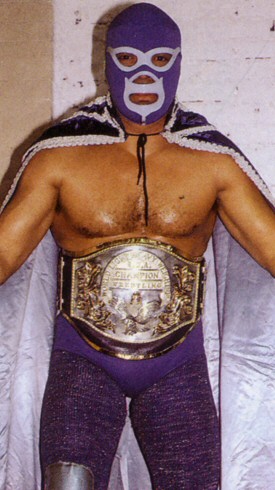 |
|
||||||||||||||||||||||||||||
Biography
Aníbal was born on November 4, 1940 in the state of Michoacán. In order to keep his identity as a secret, in different interviews he has done through the years he has stated being born at Mexico City, Mexico State, Zitácuaro or Topilejo. Something that is for sure us that he was born in the state of Michoacán.
When he was four years old his family moved to Mexico City where he had access to lucha libre, and he idolized Black Shadow and wanted to be a wrestler like him. When he was nineteen years old he started to train at the Gimnasio Baños Gloria and at the Gimnasio San Francisco de Portales, where the instructors were Chico Fernández and Salvador Flores.
He had his first professional match in November of 1963 under his real name, Carlos Carrillo. It was in Cuernavaca, Morelos and he was paid $40 pesos.
He assumed names such as Genio Azul and Príncipe Azul. Two years later his representatives designed a mask for him. He didn't want to wear a mask, but seeing how most of the younger idols were masked wrestlers he finally decided to go on with the idea. He came up with the Aníbal name.
Carlos was an avid reader of history books, and one of his favorite tales was the one of Aníbal Barca, a Carthagenian general, son of Amílcar Barca and brother of Asdrúbal. He conquered the city of Sagunto, crossed the Pyrenees and the Alps, and battled and defeated the Romans. He almost conquered the city of Rome, but he killed himself in a battle after being surrounded by the enemy troops, because he'd rather be dead than waste the rest of his life being a slave. His first mask design was strongly based on the one of Black Shadow, due to his admiration.
As Anibal, his "padrinos" (mentors) during his debut were Mil Máscaras, and his idol Black Shadow. His debut as Aníbal was in the mid 1960s in a tag team match with Cometa Dorado against Black Demon & Chico Mendoza
Anibal's rookie days were in the Arena KO Al Gusto in Naucalpan, he became a hot independent worker in Plaza De Toros El Cortijo, and in 1966 he signed with EMLL. On October 14, a bit before signing with EMLL, he lost the Distrito Federal Light Heavyweight Title against the popular wrestler now turned referee Pepe Casas.
During 1966 he wrestled for EMLL in Martes Populares. He spent the following two years working his way up the ranks in EMLL, honing his technique and high flying skills into a top level competitor at Arena Coliseo. By 1970 he became a big name wrestler.
In 1970, he won the NWA Middleweight Title from Masio Koma and started a multi-year feud with René Guajardo. On June 28, 1974, Aníbal defeated Adorable Rubí to become Mexican National Middleweight Champion. On September 20, Aníbal became a double champion by defeating El Cobarde in a match for the vacant NWA World Middleweight Title. He was voted wrestler of the year by the magazine El Halcon, which is an honor he had again in 1974.
He was one of the many wrestlers that on May of 1975 left EMLL to join the newly created UWA. His championship match against his longtime rival Rene Guajardo for the UWA World Middleweight Title was key in the inaugural event of Promociones Mora-Flores in Palacio de los Deportes. Aníbal was already a very popular wrestler and had big profile rivalries with people like El Marquez, but his most memorable feuds and matches were with Rene Guajardo, Ray Mendoza, Perro Aguayo and others turned him into a legend.
He was a big star until the mid 80s, where he sort of disappeared from the scene due to injuries. His style had changed so much because he couldn't wrestle the fast tecnico style anymore. In 1983 he was still doing a huge campaign teaming with Villano III and El Solitario as "Los Tres Caballeros" (The three gentlemen) but in 1984 he turned rudo and formed a team with his former arch-enemy Dr. Wagner. As rudo Aníbal had a series of very bloody matches against El Solitario, a rivalry that could end in a lucha de apuestas. His last big feud was perhaps in Puerto Rico, where he lost the UWA Junior Light Heavyweight Championship to the local favorite Invader III. That was August 15, in San Juan, where the WWC promotion was having his 11th Anniversary Show. Anibal eventually regained the title and lost it on January of 1985 to Negro Navarro.
Anibal's name popped up again strongly on the lucha scene in 1991. He wrestled a lot in Panama and he started to get booked in Arena Mexico shows again.
On December 13, 1991, the event Juicio Final in which the main event was the mask vs mask agaisnt Mascara Año 2000 sold out Arena Mexico (drawing 18,000). The Anibal seen in the match was no longer in his prime, his cumulative injuries over his almost thirty years of in ring career affected his performance considerably. Even with those harships, Anibal demonstrated his resistance against his rival. The match resulted controversial due to the intervention of Cien Caras when he smashed a bottle on Anibal's head and the even more controversial ending of the match. Mascara Año 2000 won by disqualification after the referee "received" a foul by Anibal. After his mask loss he had a short tour all over Mexico and retired. It's said that Anibal really needed the money.
He eventually returned some months later after his good friend Tony Arce convinced him, but his hip was in so much pain that he needed surgery again so he retired for good. Before retiring, he had a last tour in Panama where he lost his mask to local legend Sandokán to culminate a 20 years plus feud.
On December of 1993, AAA had an Anibal benefit card because after the surgery he had gone bankruptcy. This card was actually promoted by the "Jose María Álvarez" foundation, which is a foundation that collects money for homeless kids. This was their way to say thank you to Anibal, who in the past promoted countless benefit cards for that association. Everybody that met him will agree that he was a great man and a class act.
An Hijo del Anibal made his debut on October 24, 93 at El Toreo.
Anibal died on March 9, 1994 at age 53 due to a brain tumor.
Notable Matches
| Date | Location | Match |
|---|---|---|
| 01/29/75 | Palacio de los Deportes | Anibal beat Rene Guajardo to retain his NWA Middleweight Title |
Luchas de apuestas record
Gallery
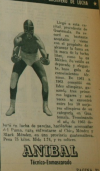 |
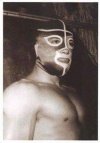 |
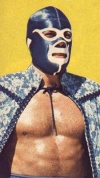 |
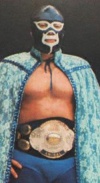 |
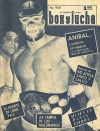 |
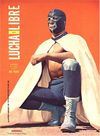 |
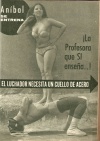 |
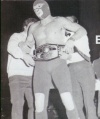 |
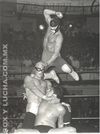 |
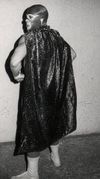 |
 |
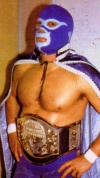 |
 |
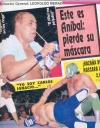 |
 |
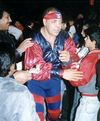 |
 |
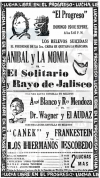 |
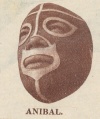 |
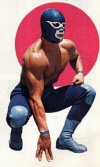 |
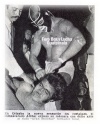 |
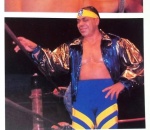 |
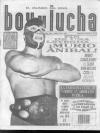 |
 |
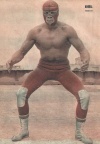 |
 |
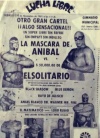 |
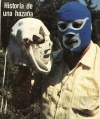 |
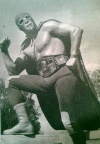 |
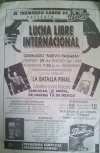 |
 |
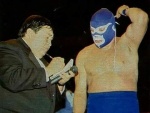 |